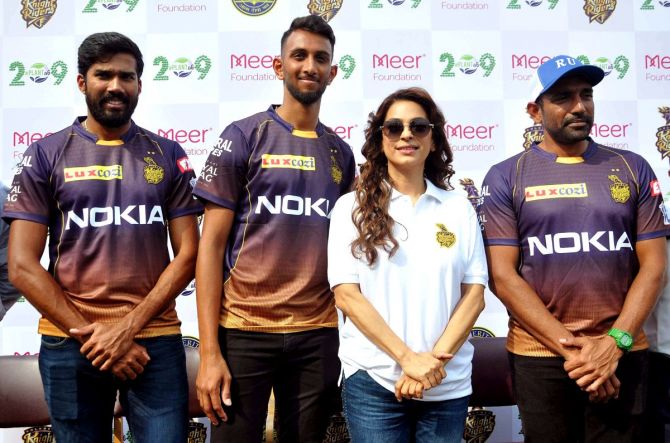The Delhi high court on Friday dismissed actress Juhi Chawla's lawsuit challenging the setting up of 5G wireless networks in the country and slapped a cost of Rs 20 lakh on her and co-petitioners by describing the plea as 'defective', 'abuse of process of law' and filed for 'gaining publicity'.

Justice J R Midha said the plaintiffs -- Chawla and two others -- have abused and misused the process of law and wasted the court's time.
The judge said the plaint in which questions have been raised about health hazards due to the 5G technology was 'not maintainable' and was 'stuffed with unnecessary Scandalous, frivolous and vexatious averments' which are liable to be struck down.
The court said the suit filed by actress-environmentalist and others was to gain publicity which was clear as Chawla circulated the video conferencing link of the hearing on her social media account which resulted in the repeated disruptions thrice by unknown miscreants who continued disruptions despite repeated warnings.
The court also issued show cause notice against those unidentified persons who disrupted the proceedings asking as to why proceedings for contempt of court be not initiated against them.
It asked the Delhi Police to identify the persons and serve the notice on them and listed the matter for reporting compliance before Joint Registrar on July 5.
During the June 2 hearing on Chawla's plea, a man started singing some of the hit songs of the actress' movies and caused repeated interruptions in the virtual proceedings.
On the judge's directions the person was repeatedly removed from the hearing, but he kept on joining with different names and started singing till the time the proceedings were locked.
The court said the observations made by Justice Rajiv Sahai Endlaw of the high court in one of the cases that 'This is a classic textbook case of, how not to draft a plaint, which should be taught in law colleges and to young lawyers so that such bloopers in drafting of pleadings, damaging to one's own client, are avoided' is fully applicable to the present case.
After pronouncement of the order, Chawla's counsel sought a stay on the verdict for filing an appeal against it which was outrightly denied by the court.
Advocate Deepak Khosla, appearing for the actress and others, questioned the imposition of cost contending that it was without any legal basis and attempted to show a Supreme Court' verdict.
However, the judge said 'very sorry. Rejected. The matter is over. You gave your regal remedies. It would not be proper for a counsel to comment on the order. As a counsel you should know your limits'.
The court, while pronouncing the order, said, 'The plaintiffs abused and misused the process of law and wasted the court's time.
'A cost of Rs 20 lakh is imposed on the plaintiffs. It appears the suit was filed to gain publicity which is clear as plaintiff no. 1 (Chawla) circlulated the link of the hearing on her social media account which caused repeated interruption in the proceedings by unknown persons.'
It said the cost be deposited by the plaintiffs -- Chawla, social worker Veeresh Malik and Teena Vachani, with Delhi State Legal Services Authority within one week and in case of failure, the authority can initiate the process to recover the amount. DSLSA shall utilise this cost for the cause of the victims of road accidents, it said.
Besides the cost of Rs 20 lakh, the court also asked the plaintiffs to deposit the deficient court fees of Rs 1.95 lakh, failing which the registry shall place the copy of this judgment before the concerned court in those proceedings.
'No case is made out for granting permission to institute the suit, or to sue in representative capacity as the suit is defective and not maintainable. The plaint is stuffed with unnecessary, scandalous and frivolous averments,' it said.
'Although the plaint is not based on any special damage suffered by plaintiffs by EMF radiation caused by cellular telecommunication technology, the plaintiffs have attempted to set up a new plea in that the plaintiffs have been advised that they suffered special damages because of EMF radiation caused by cellular telecommunication technology,' the court said.
The court added Chawla and the two others not only did not comply with the provisions of the Code of Civil Procedure (CPC), but also flouted several other mandates under the Code.
It said the plaint is not verified and the plaintiffs have mentioned that only a few paragraphs were said to be 'true to their knowledge' and the suit was based on legal advice which is not maintainable and as mandated under the law, the plaintiffs did not approach the authorities claiming their rights and directly moved the court.
It questioned them as to why as many as 33 parties have been added to the plaint and said it is not permitted under the law.
The court had on June 2 reserved its order on the issue of maintainability of the plaint in which the plaintiffs sought a direction to the authorities to certify to the public at large that how 5G technology is safe to humans, animals and every type of living organism, flora and fauna.
The suit said that if the telecom industry's plans for 5G come to fruition, no person, animal, bird, insect and plant on earth will be able to avoid exposure, 24 hours a day, 365 days a year, to levels of RF radiation that are 10x to 100x times greater than what exists today.









